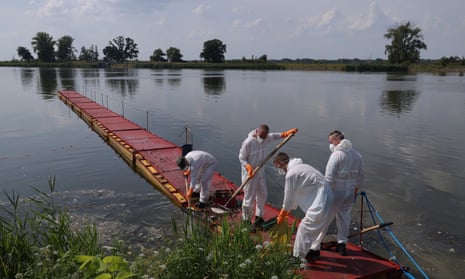Rare micro-organisms known as golden algae could be the cause of a mass die-off of fish in the Oder River that has puzzled scientists for days, Poland’s environment minister has suggested.
“After further investigations, the Institute of Inland Fisheries in Olsztyn has found rare microorganisms, so-called golden algae, in water samples from the Oder River,” Anna Moskwa said on Thursday.
The algal bloom could cause the appearance of toxins that killed fish and clams but were not considered harmful to humans, she said.
German municipalities banned bathing and fishing in the Oder after masses of dead fish and molluscs were found floating on the water surface and washed up on the banks of the 520-mile (840km) river, which runs from the Czech Republic to the Baltic Sea along the border between Germany and Poland.
Since last Friday Polish firefighters have recovered more than 100 tonnes of dead fish from the Oder, with the German environment minister, Steffi Lemke, reporting an estimated 35 tonnes of killed fish in her territories.
Scientists have struggled to find an explanation for the die-off. Early reports of increased levels of mercury in the Oder waters were later found to be misleading.
Water samples were sent to laboratories in the Czech Republic, the Netherlands and Britain in the hope of finding the cause.
Golden algae (Prymnesium parvum) is usually found in brackish waters where rivers meet the sea, but is known to spread farther inland when there are high levels of salinity in the water.
“This species of algae requires raised saline levels that do not naturally occur on the affected stretch of the Oder at all,” said Jan Köhler, of Berlin’s Leibniz Institute of Freshwater Ecology and Inland Fisheries.
Polish officials have investigated whether particularly higher concentrations of pollutants and salinity could be linked to climate change, with exceptionally high temperatures across Europe in recent weeks leading to more water evaporating from inland waters.
after newsletter promotion
Mineral fertilisers seeping into the river from adjacent farmland also has the potential to bring about massive algal blooms, scientists said.
A chemical spill was another hypothesis being investigated, with Poland offering a reward of 1m złoty or €210,000 (£180,000) for anyone who could “help find those responsible for this environmental disaster”.








